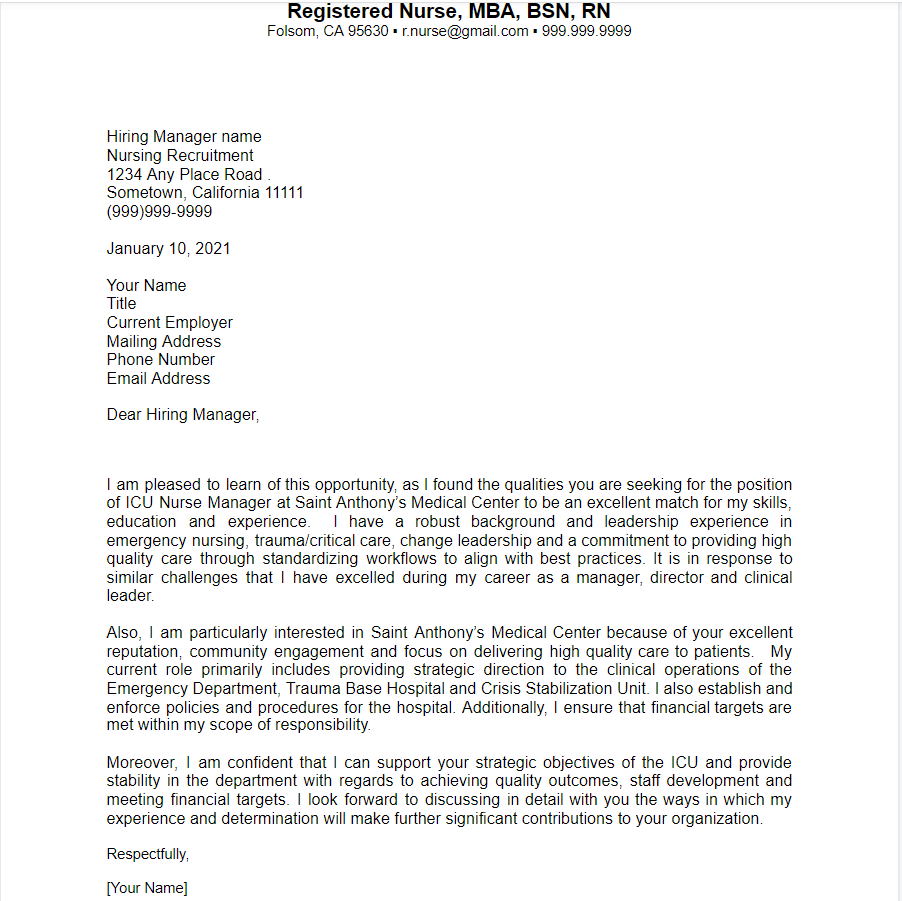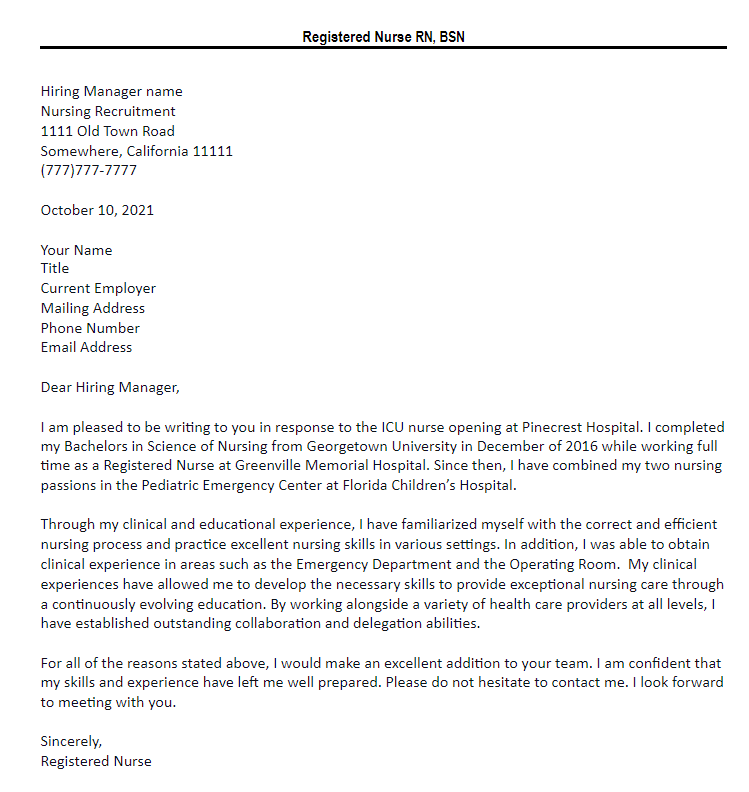Career Resources / Job Searching / Nursing Cover Letter
Reviewed by: Kiley Griffin, R.N.
Writing an effective nursing cover letter may seem unnecessary–trust us: it’s not. Roughly 45% of job seekers send resumes without a cover letter. Yet, a majority of employers prefer cover letters to go with a resume.
When looking for a new job, nurses often spend the most time developing their resumes. Sometimes they neglect their cover letters or don’t write one at all.
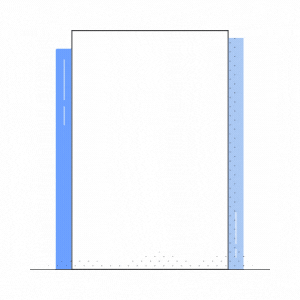
Whether you are a new grad nurse or a nurse veteran, a good cover letter is a great way to separate yourself from the pack. Even if a hiring manager only skims it, it can mean the difference between you and another candidate getting the job if something catches their eye.
In this post, we will explore the following:
- Examples and a Template for a Nursing Cover Letter
- When Nursing Cover Letters Are Required
- Benefits to Writing a Cover Letter
- Steps for Writing a Cover Letter
- Common Mistakes to Avoid When Writing a Cover Letter
Get job matches in your area + answers to all your nursing career questions

Nursing Cover Letter Examples and Templates
With the right care and effort, you can craft a professional nursing cover letter that helps distinguish you from other candidates.
We’ve provided two sample nurse cover letters and a template to help give you an idea of what to write.
Nursing Cover Letter Template
Hiring Manager name
Nursing Recruitment
1234 Any Place Road
Sometown, California 11111
(999)999-9999
June 16, 2021
Your Name
Title
Current Employer
Mailing Address
Phone Number
Email Address
Dear Hiring Manager,
I am pleased to learn of this opportunity, as I found the qualities you are seeking for this position to be an excellent match for my skills, education, and experience.
I have a robust background and leadership experience in emergency nursing, trauma/critical care, change leadership, and a commitment to providing high-quality care through standardizing workflows to align with best practices. It is in response to similar challenges that I have excelled during my career as a manager, director, and clinical leader.
Also, I am particularly interested in [the company] because of your excellent reputation, community engagement, and focus on delivering high-quality care to patients. My current role primarily includes providing strategic direction to the clinical operations of the Emergency Department, Trauma Base Hospital, and Crisis Stabilization Unit. I also establish and enforce policies and procedures for the hospital. Additionally, I ensure that financial targets are met within my scope of responsibility.
Moreover, I am confident that I can support your strategic objectives of the ICU and provide stability in the department with regard to achieving quality outcomes, staff development, and meeting financial targets. I look forward to discussing in detail with you the ways in which my experience and determination will make further significant contributions to your organization.
Respectfully,
[Your Name]
When Nursing Cover Letters Are Required
Here are the most common scenarios when a nursing cover letter is required:
- Applying directly to a specific person: Suppose the job posting invites applicants to apply to a particular individual instead of a general application system. In that case, it is appropriate to include a cover letter and address it to the individual. This is especially important for new grad nurses with less experience.
- Referral for a position: Don’t skip the cover letter If you apply for work based on another professional or mentor’s recommendation. Use the cover letter to explain that someone referred you to the job and specify whom. This allows hiring managers to see that someone they value as a trusted professional in the healthcare industry believes you are qualified for a position.
- When requested in a job listing: Some job listings specifically request candidates to submit a professional cover letter with their application. Following job listing requirements to include a cover letter shows hiring managers that you follow instructions and have an eye for detail. Both are essential qualities in the nursing profession.
Benefits to Writing a Nursing Cover Letter
Knowing you are the best candidate for the job and proving it are two different things. You may have an impeccable nursing resume; however, 20 other candidates are applying for the same position.
Nursing careers are in demand, but that does not mean there isn’t competition for specific nursing positions such as a nurse practitioner or nurse educator.
Resumes are neatly spun packages of information about a candidate’s education, job history (when applicable), and professional certification. They leave little room for information about who you are as a candidate.
That is where a good cover letter comes in. With the proper cover letter format, your cover letter will offer several advantages and is a great way to showcase your nursing skills.
Identify your intent
Resumes indicate your worth. Cover letters reveal your intent. Outline how your desires and skills align with the job you are applying for. This shows the hiring manager you are interested in the position.
Hopefully, it’s not going to be just another job for you. It will become part of your mission and vision as a nursing professional. For instance, if a position will help grow your leadership skills and prepare you for an advanced nursing career, state that as part of the intent.
Provide a more in-depth description
Your education and credentials make up only a small portion of who you are as a nursing professional. How someone looks on paper is not an indicator of how they will perform. It does not accurately gauge their character.
In that sense, a cover letter provides a sample of what the hiring manager will expect in the interview.
Using a cover letter to honestly explore your strengths, weaknesses, experiences, interests, and perspectives is an asset. Maybe your resume includes a certification or award you are proud of. Expand on it in the cover letter.
Pro-tip: Using some of the traits and terms found in the job’s job description is a great way to stand out as a candidate, as it shows you have the qualities the employer is looking for.
What makes you proud of that achievement and how does it make you the best candidate for the position?
Explain the gaps
Hiring professionals suggest resumes span one page for new nurses and those with less than 10 years of experience. Due to length limits, it is hard to explain any gaps in work history. Also, resumes leave out room for detailing why you may have shifted gears from an earlier career into nursing.
A cover letter provides the perfect opportunity to explain these situations.
Establish a willingness to work
Cover letters add an extra touch to a job application. As stated, nearly half of all job applicants fail to include a cover letter with their job applications unless requested.
Going that extra mile shows a hiring manager that you are willing to put the work in to get the job done right. That is a desirable quality for any business or industry, especially in nursing and other healthcare careers.
Remember that a cover letter should focus on a resume’s highlights, fleshing them out in a more meaningful way.
These are key purposes of a nursing cover letter.
Include only information that falls into one of the four benefits listed above to get the most mileage out of your cover letter.
Top nurse jobs on Incredible Health
🏥 Nurse Practitioner, Cardiac Care
West Orange, NJ | $99,000 to $153,000 /year
🏥 Registered Nurse – Hospice
Arlington, MA | $75,000 to $150,000 /year
🏥 Registered Nurse – Medical Surgical/GI/Operating Room
Atlanta, GA | $60,000 to $100,000 /year
🏥 Registered Nurse – Recent Grad ICU
Dublin, GA | $40,000 to $80,000 /year
🏥 Staff Nurse (RN), Med Surg
Newburyport, MA | $75,000 to $150,000 /year
Get matched with these and thousands more permanent jobs on Incredible Health.
Steps for Writing Your Cover Letter
The nursing field requires structure and proper etiquette.
You wouldn’t walk into a patient’s room and say,
“hey, Adam, what’s up, man?”
The same need for etiquette and structure applies to writing a cover letter.
Accordingly, we have provided steps to writing a successful nursing cover letter.
1. Create a header
When a nurse injects a patient with a vaccine, they clean the area first with an alcohol wipe. They don’t just stick the needle in. In the same vein, you need to start by listing your name, phone number, email, and residential address.
Make sure you put the date under that information.
Last, include the recipient’s contact information as well.
2. Use a professional greeting

This is your first impression – show respect. Using “Dear” will work when sending a formal cover letter. If you don’t know the hiring manager’s name, simply write “Dear hiring manager.”
3. Write your opening paragraph
Your first paragraph serves as the bait or pitch to get the hiring manager’s attention. Don’t bother placing a fishing lure of fluff to try and get their attention. It’s essential to lead with honesty and earnestness.
While writing this paragraph, make sure you include the title for the position you’re applying to. If you’re applying to work as an RN, state that. Next, articulate why you applied for this job to begin with and your overall excitement to obtain this role.
Make sure that you key in on specific details about the position and how they interest you.
Here’s an example of a stellar opening paragraph:
I am thrilled at the opportunity to apply at St. Joseph’s Hospital as an ICU nurse. As an ICU nurse with over six years of experience, I have gained the necessary skills to perform my role excellently. Specifically, I am excited about the opportunity to work on a 35-bed unit with the demands it requires. I think that my experience, passion, and skill set make me an ideal ICU nurse at St. Joseph’s Hospital.
4. Write your background paragraph
Dedicate this paragraph to your career in nursing up to this point. You want to include all the most applicable skills that pertain to this position. Be specific. Include the detailed duties that you performed that correspond to this new role.
If you’re applying to work in oncology, but have training in wound therapy, maybe don’t lead with that. Try including only relevant examples.
Next, include any measurable achievements you’ve had in other jobs that relate to this role. Keyword: measurable.
Here’s an example of a job posting for an ICU nurse:
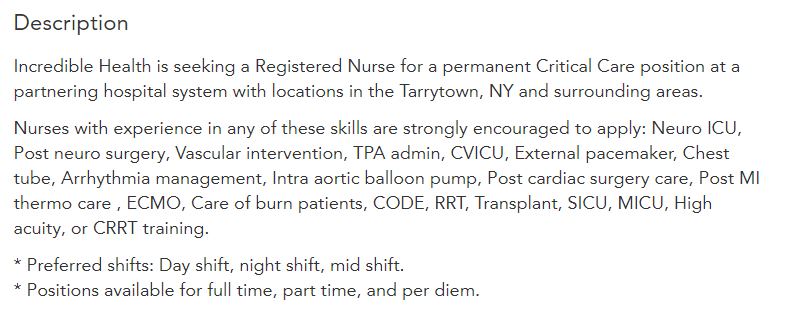
Now, here’s a great way to respond to such a job posting:
My experience as a CVICU nurse has allowed me to develop the necessary skills to provide exceptional nursing care through a continuously evolving education. One of my greatest achievements is training 10 CVICU nurses to handle the CVICU and work with external pacemakers and post-cardiac surgery care. By working alongside a variety of health care providers at all levels, I have been able to establish outstanding collaboration and delegation abilities. Through my education, a strong emphasis on patient advocacy and ethical decision-making has been incorporated. Therefore, I have learned to place patient care at the utmost importance. I have developed strong assessment and critical thinking skills. This allows me to deliver the highest quality patient-centered care.
5. Expand on qualifications
Try adding a few short stories that can highlight your primary achievements. This is a great opportunity to highlight your soft skills as well.
Some potential soft skills include:
- Communication skills
- Leadership
- Problem-solving skills
- Ability to work under pressure
6. Craft a conclusion
In your concluding paragraph, circle back to why you’re the best candidate for this role. Try to expand on your eagerness to obtain the position. End the paragraph with a call to action. A call to action expresses your desire to hear from them soon with next steps regarding the hiring process.
7. End your letter formally
Just like you began your letter, conclude your letter professionally with a “Sincerely” or “Respectfully,” followed by your name. Ending your letter this way helps it end on a high, formal note.
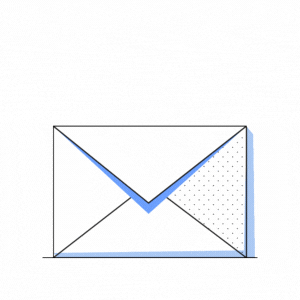
Common Mistakes to Avoid When Writing Your Cover Letter
In the nursing profession, a mistake can lead to a lawsuit. When writing a nurse cover letter a mistake could lead to you not getting a job. Below are some of the common mistakes to avoid when writing your cover letter.
- Typos: The nursing profession has a lot of difficult and wonky spellings. For example, you may be proficient at Arrhythmia management, but do you know how to spell it? Having typos within your cover letter sends the message to your hiring manager that you might not be detail-oriented and that’s one of the most important traits in a nurse.
- Focusing too much on yourself: According to Forbes, this is another common mistake to avoid. Often people try to list all their accomplishments in ways that don’t directly tie into how they can help the company. You want your cover letter to be strategic and it’s imperative to list ways that you can help the employer.
- Lying: This should be obvious but it’s crucial that you tell the truth in your cover letter. The truth will eventually come out. The best policy is to just practice honesty.
- Addressing the letter to the wrong person: This is a critical mistake. The recruiter or hiring manager probably will just stop reading at that point.
- Re-writing your resume: Unfortunately, this is a common error when writing a cover letter. As explained earlier: resumes explain your worth, cover letters show your intent. They are two separate documents and a hiring manager will know if you attempt to merge them.
- Using a different font than your resume: It may seem like a small detail, but using the same font on your resume shows that you pay attention to detail.
You’ve made it. Congratulations!
Writing a cover letter on its own separates you from the pack. However, writing a strong cover letter makes you an even more intriguing candidate. A nurse wouldn’t leave a stitch when sewing up a wound and neither should you leave a job unfinished when applying for a job.
Get job matches in your area + answers to all your nursing career questions

Nursing Cover Letter FAQs
Your nursing cover letter shouldn’t be longer than a page. The recruiter should be able to read it quickly and get a good idea of what you offer the company. Anything longer than that and you risk the recruiter tossing your letter.
It’s best to use either Times New Roman or Arial when writing a nursing cover letter.
The cover letter should expand on information found in the resume. It should provide insight into your skills, qualifications and background.

